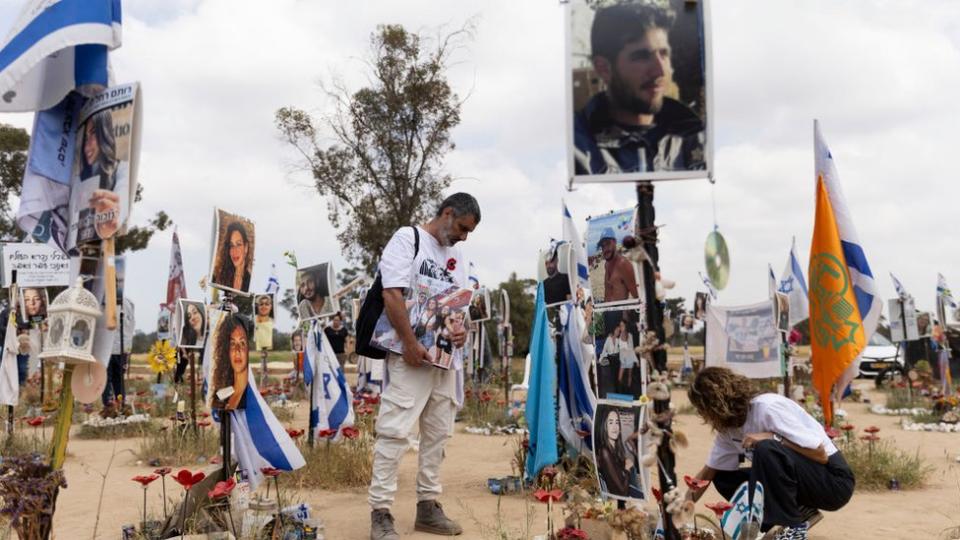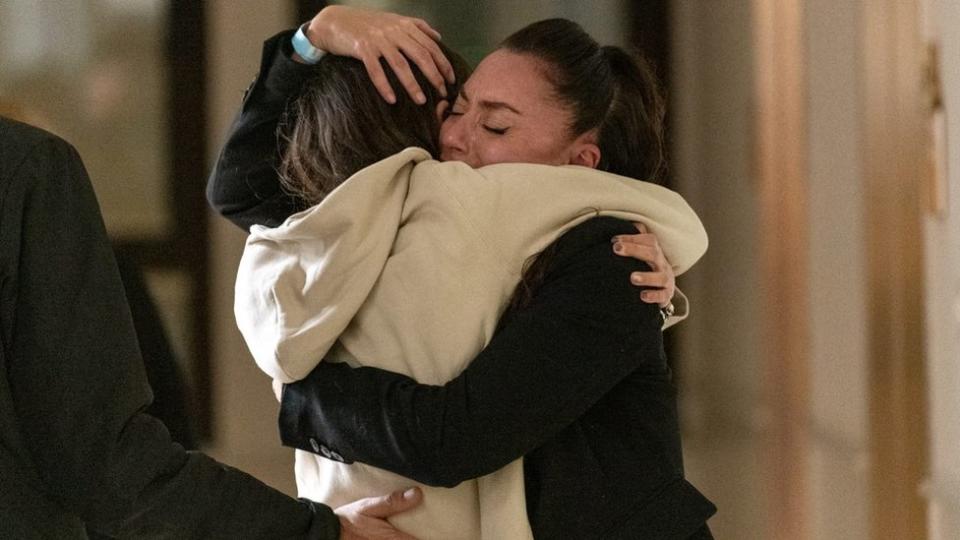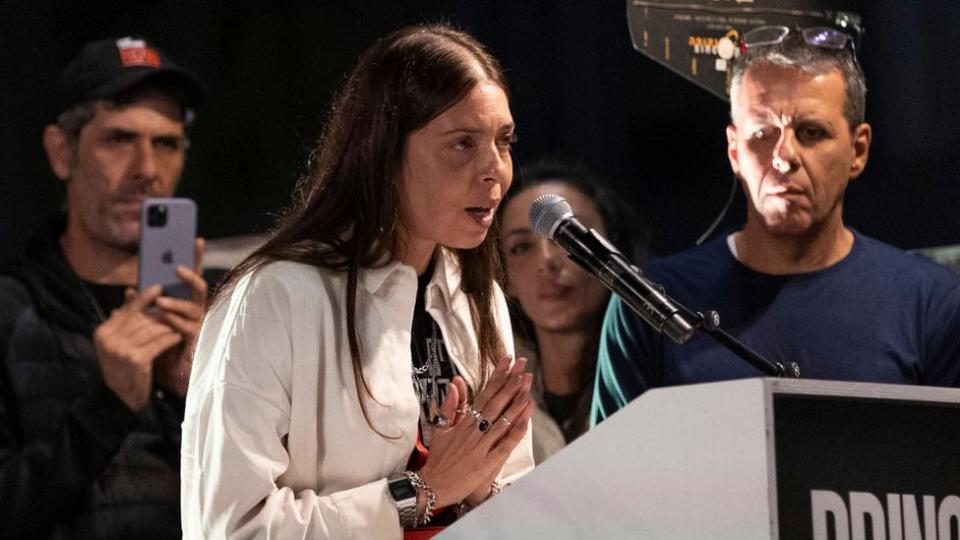'I thought just kill me quickly': Gaza hostage's 54 days in captivity
It was the third time they caught her.
Crouching in a shallow dip in the field, Moran Stella Yanai knew this time was different.
"I heard 'Coo-coo!' and we raised our heads up - the terrorists were standing [there], smiling," she said. "Everyone started to run, I jumped and broke my leg, and they caught me."
Warning: This article contains details some readers may find disturbing.
Moran had been desperately trying to hide in the sparse cover of a potato field, as Hamas gunmen raided the site of the Nova music festival, a few miles from the Gaza border.
Hours earlier on 7 October, the gunmen had burst through Gaza's perimeter fence, attacking Israeli communities.
Moran had already been caught twice by groups of Hamas followers, she said, but had talked her way out by insisting she was Arab, and not Jewish.
The third time, her captors were different.
"They didn't talk, they just grabbed me," she remembered.
"They started to throw me from one to the other, and put me in the car. Two terrorists in the front, four in the backseat, three more in the [boot], and only me on top of everybody."

As they crossed the Gaza border, Moran glimpsed the crowd on the other side of the fence, before quickly closing her eyes.
"It was like a bull being entered into a huge arena," she told the BBC. "Everybody's happy - the children, the women, the men. It was tons of people."
She felt the car stop, and the car door open.
"I felt someone trying to pull my leg... All you can think of at that point is: please let it end fast. One hit to the head, and I will not feel anything. If it's happening, make it fast."
But the car door closed again, and the vehicle began to move off, carrying Moran with it. She says she later learned that the group holding her had sold her to Hamas.
It was the beginning of 54 days in captivity for Moran. During that time, she was transferred between seven different locations, quickly learning strategies to survive.
"You really need to protect your story," she explained. "What happens in the first house stays there, and doesn't come with you to the second house [or] the third house."
Each time, she said, it was important to pretend that everything in the previous location had been fine, and that her kidnappers had been her friends.
To hint at anything sexual, she believes, would have led to the group killing both captor and captive.
At one point, she was held with another woman, who was 18 years old and kidnapped while she was barefoot and still in her pyjamas. Moran, who understands a little Arabic, remembers overhearing their captors discuss who would take the women as their wives.

She said they even found the younger woman's mother among the other hostages and brought her in, asking for permission to marry her daughter.
"When you move from house to house, you need to be 'examined' to see that you're not hiding something on you," Moran said, sarcasm tilting across her face. "It's a 'really necessary test', as they explain it to you."
She looks away, the silence growing between us.
"I always try to explain to people that 'rape' is a really big word," she said. "It's not only the act. Even when a guy stands in front of your door, and you're sitting down, and he's staring at you for 10 minutes straight, five to six times a day, every day, for 54 days. Trust me; that's a rape."
Asked whether she was the victim of sexual assault while held captive, Moran says she was not, but that she has heard from other women hostages that they were raped while in Gaza.
She described being beaten up by her captors, and the mental terror of being powerless in a situation that could change in a second.
One day, she said, they sat down to play cards with their captors.
"I was so hungry, I was trying to make them laugh so they would bring us something to eat," she remembered.
"[One of the captors] was mocking me. I got angry and said something as a joke. He runs to the other room, comes back, and points a gun to my head, yelling at me, screaming that he will kill me, will blow my head off."
After 54 days in captivity, Moran Yanai was released in a ceasefire deal last November, in exchange for Palestinian prisoners held in Israel jails.
Her Hamas captors filmed the handover, where she and other hostages were seen smiling and thanking their kidnappers before boarding the Red Cross bus out of Gaza.
Many people remarked at the time that they seemed well and even happy.
"They made us smile, and say thank you," Moran said. "Nobody heard the whispers that I'm saying to the boy next to me: hold on, five more minutes, don't start to cry now, stay smiling."

It's the first time in over an hour recounting her story that Moran's composure fractures. Her tears sudden, fast and silent.
The moment she crossed the border to Egypt, she says, was the moment she had waited all those weeks in captivity to cry.
"We couldn't [cry] when they were dragging us into Gaza, we couldn't do it in the houses, and that's the first thing I promised myself - that the minute I step into my country, I'll scream as loud as I can, because nobody will take my voice anymore."
Israeli officials believe about 30 of the 133 hostages remaining in Gaza are dead. Hopes of another ceasefire deal to secure their release have dimmed.
Stories of the conditions - and sexual assaults - in captivity have gradually emerged from some of those already released.
Moran says she lost 12% of her bodyweight, and her hair, during 54 days in Gaza, and that her body was covered with scars.
It is hard for her to imagine what it's like for the hostages still held there, five months on.
"If this isn't solved, then no-one is free," she said. "I can't go back to a daily routine; I can't go back to anything."
If you have been affected by any of the issues raised in this story you can visit BBC Action Line.

